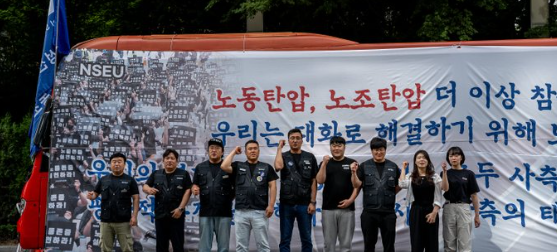No one ever expected this taking place as the company is known as being historically resistant to organized labor.
For the first time in its history, employees at Samsung Group, the dominant force in the South Korean economy, were poised to initiate a strike on Friday.
🇰🇷 Samsung Electronics biggest union has gone on a strike over pay dispute, for the first time in the company’s history
Up to 28,000 people at tech giant in South Korea will strike for one day on 7 June after negotiations over wages stall.
A major union representing tens of… pic.twitter.com/dHqjzintxk
— X News Journal (@XNewsJournal) June 7, 2024
This development unfolds amid Samsung’s efforts to reclaim its position in the memory chip business, a crucial sector in the rapidly evolving landscape of advanced artificial intelligence technologies, which are reshaping traditional rivalries among global tech giants.
The strike primarily involves workers in Samsung’s chip division, expected to constitute the majority of those abstaining from work on Friday as part of a planned one-day strike. Representatives of the union stated that numerous rounds of negotiations concerning wage increases and bonuses had reached an impasse.
Lee Hyun Kuk, vice president of the Nationwide Samsung Electronics Union, the largest labor group among five at the company, criticized Samsung’s approach, stating, “The company doesn’t value the union as a negotiating partner.” The union claims to represent 28,000 members, approximately one-fifth of Samsung’s global workforce, with nearly 75 percent voting in favor of the strike in April.
According to Mr. Lee, union workers received no bonuses last year, a stark contrast to previous years where bonuses amounted to as much as 30 percent of their salaries. This disparity has led to a feeling among workers of effectively enduring a significant pay cut. On average, union workers earned about 80 million won last year, approximately $60,000 before incentives.
Samsung, while acknowledging efforts to reach an agreement with the union, refrained from commenting further on the impending strike.
Samsung Electronics’ labor union starts collective leave “walkout” on Friday#SouthKorea #economy #Samsung_Electronics #labor_union_walkout #삼성전자 #경제 #Arirang_News #아리랑뉴스 pic.twitter.com/ZpSfSNtkeO
— Arirang News (@arirangtvnews) June 7, 2024
The work stoppage is not anticipated to impact Samsung’s manufacturing output significantly, strategically scheduled between a national holiday and the weekend when many South Korean workers plan vacation days. Nonetheless, the timing presents a challenge for the company, which seeks to reassure clients and investors regarding its chip business’s capacity to meet the demands of the AI industry boom.
Despite Samsung’s historical dominance in memory chip manufacturing, recent financial reports reveal a decline. Following four consecutive quarters of losses, Samsung concluded last year with its weakest earnings in over a decade.
However, despite these setbacks, Samsung retained its position as the world’s leading memory chip manufacturer by revenue and market share, according to TrendForce, a market research firm. Nevertheless, local competitor SK Hynix claimed the top spot in the high-bandwidth memory chip market, crucial for AI systems, precipitating increased demand. This shift underscored Samsung’s lag in anticipating market trends compared to its competitors.
The current situation reflects a significant challenge for Samsung’s chip division, exemplified by the largest financial shortfall in the company’s history. Jun Young-hyun, newly appointed to lead Samsung’s chip division, inherits this formidable task amid internal restructuring.
For the first time, workers at Samsung went on strike on Friday. The South Korean tech giant is at odds with some of its employees as it is trying to reassure investors that its memory chip business can meet demand. https://t.co/DaJIT708OA
— The New York Times (@nytimes) June 7, 2024
Samsung aims to address these challenges through substantial investment initiatives, intending to triple the output of high-bandwidth memory products from the previous year, with further doubling projected by 2025. Plans include significant investments in a new semiconductor industrial complex in South Korea and facilities in Texas.
This period of corporate transformation coincides with Samsung’s efforts to move past years of turmoil, including legal controversies involving its top executive, Lee Jae-yong. The conglomerate’s influence over South Korea’s economy and politics remains under scrutiny due to Lee’s legal entanglements.
Historically resistant to organized labor, Samsung has only recently seen unions gain traction among its workforce. Friday’s strike represents a milestone in the union’s efforts to assert its influence within the company and signal its maturation.
Major Points:
- Samsung Group faces its inaugural worker strike, led by employees in its chip division.
- Disputes over wage increases and bonuses have led to failed negotiations between the company and the union.
- Despite Samsung’s historical dominance in memory chip manufacturing, recent financial reports reveal consecutive quarterly losses.
- Rivalry intensifies as SK Hynix claims the top spot in high-bandwidth memory chip production, a key component for AI systems.
- The strike marks a pivotal moment in Samsung’s labor relations and underscores challenges in its chip business amidst a changing market landscape.
James Kravitz – Reprinted with permission of Whatfinger News


